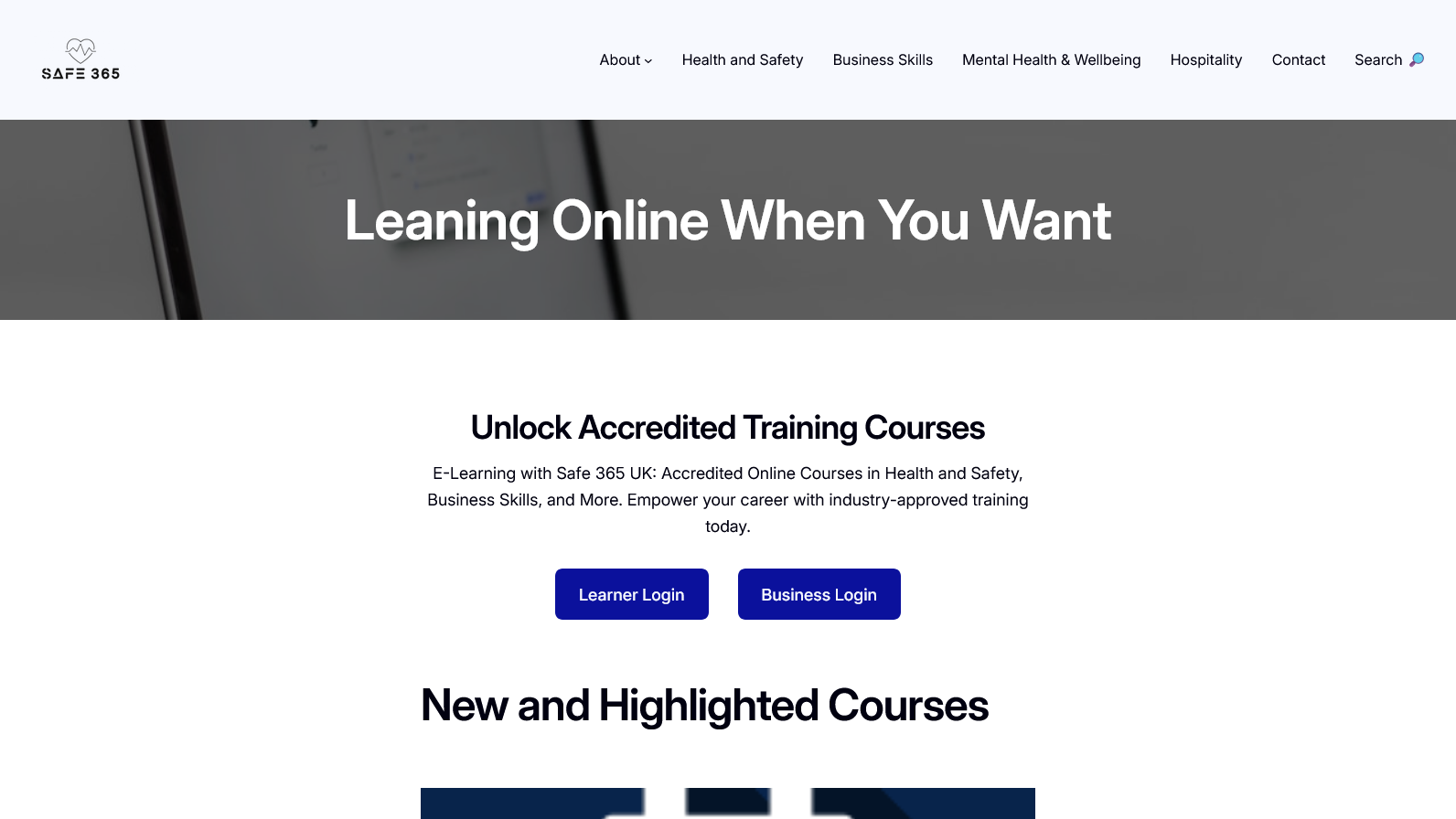Quick Links:
Products / Services

Introduction to Generative AI Course
The course starts by explaining what generative AI is, how it works, and why it’s such an impactful technology in today’s world.
It then moves on to explore the history and evolution of generative AI, seeing the innovations that, through time, have paved the way for today’s advancements in the field.
Next, the course covers the different types of generative AI models, detailing the various ways AI can generate new content, setting out the strengths and limitations of each approach.
Following this, the course showcases some incredible real-life examples of how generative AI is being used across different industries.
And finally, the course peeks into the future of generative AI, looking at emerging trends, as well as the ethical and societal implications posed by the technology.

Cyber Security Course
Employees, managers and directors should all have a good understanding of the threat posed by cyber-attacks and the importance of guarding against data breaches.
This short course will explain why cyber attacks and data breaches happen and provide practical advice on how to set up effective defences.
First, the course will identify potential ‘cyber threat actors’ who initiate cybercrime, along with looking at the main motivations behind cyber-attacks on individuals and organisations.
On a more practical level, you’ll learn how to recognise and deal effectively with phishing attempts. The course will highlight the importance of keeping passwords secure and cover security for devices, such as smartphones, laptops, tablets or desktop computers.
You’ll learn how to report a suspected cyber attack, and what to do if you genuinely make a mistake.
Finally, we’ll underline the importance of cooperation and show how working closely together helps overcome a wide range of cybersecurity issues.

Facebook for Business Course
This Facebook for Business course will show you how to use Facebook effectively for your business.
It starts by examining Facebook’s history and its phenomenal growth to almost 3 billion active users.
You’ll learn how to set up and optimise your Facebook Business page.
We’ll show you how to create an effective Call to Action, organise your page tabs and create and build your follower count by sharing engaging content.
There’s information on how to use Instant Experience ads, set up Events, create Live video moments and use Facebook as a recruitment tool.
In a major section on Facebook advertising, we’ll examine effective ways to boost engagement – including how to define your target audience, choose the right ads for your audience and effective ways to design and build your ad content.
Finally, we’ll show you how to test, track and evaluate your ad campaigns using key metrics.

Instagram for Business Course
This course starts by exploring the history of Instagram to help you understand how it’s become such a powerful tool for generating sales, reaching new audiences and building brand awareness.
You’ll learn how to set up an account and build and optimise a Business Profile.
The course will cover the kind of content to post and how to enhance effectiveness with photos and videos.
There’s information on how to respond to comments, use direct messaging and repost user-generated content relevant to your brand to keep your audience engaged.
We’ll explore the essential elements of an effective Instagram marketing strategy and show how to maximise the value of your account using brand identities, content strategies, hashtags and working with influencers.
You’ll learn how to use extra features such as Instagram advertising, connecting to third-party scheduling apps and Instagram shop and product tagging.
Instagram Analytics and Insights are essential for success on the platform so we’ll cover how to access and use these effectively.
Finally, we’ll cover how you can use your findings to develop new and more powerful Instagram strategies.

Social Media Marketing Course
This online course examines the main social media platforms and their use as marketing tools.
In particular, we’ll look at Facebook, Instagram, LinkedIn and Twitter.
We’ll cover the main business benefits, along with how social media can provide increased market insight and help establish your company as an ‘influencer’.
We’ll discuss the sectors that use social media marketing the most and there’s advice on how to get started with social media marketing, and how to choose the right platforms.
You’ll see how to run campaigns with great content and compelling visuals and measure the effectiveness of your campaigns.
We’ll show you how to create a Social Media Policy and use social media for internal communications.
You’ll learn how to build social media into your recruitment campaigns, and train employees to use social media to promote your company.
Online security is crucial and we’ll cover the basic aspects everyone needs to know.
Finally, you’ll learn how to handle negative feedback on social media, and the T-E-A approach to handling complaints successfully.

TikTok for Business Course
TikTok is one of the world’s fastest growing social networks and is available in over 150 markets with over 1 Billion users each month.
The format involves posting short-form videos – mostly for entertainment. However, it also presents significant opportunities for businesses.
This course starts with the history of TikTok, its user demographics and the three business benefits offered by the platform.
On a practical level, we’ll show you how easy it is to create your TikTok Business account and optimise your profile.
There’s information on how to create engaging content for your existing and potential customers, how to get to know your target audience, develop your content strategy and partner with influencers.
TikTok ads spread awareness of your company or promote the sale of your products or services.
We’ll discuss the importance of TikTok advertising campaign strategies, whether it’s a one-off offer, an advertisement group or a collection of advertisement groups.
Finally, we’ll show you how to use TikTok’s analytics tools to monitor the success of your advertising and use your insights to generate increasingly effective campaigns in the future.

Twitter for Business Course
Twitter is a social media platform that is used by a wide range of people, from celebrities, who use it to communicate with their fans to companies and brands who can use it to engage their customers and attract new ones. It is also used by people for the social aspect – to chat and share information with friends. In fact, there is no restriction to who or what can have a Twitter account and often a larger company such as Starbucks will also have individual accounts for each product such as Frappuccino’s and even individual store locations.
Using Twitter successfully requires a significant commitment of time – being active is key to your success. It’s all about the image you create, and the best‐viewed companies are the responsive ones.
Twitter is a real‐time information sharing network where users can share messages, news, images, opinions and links via short bursts of information called ‘tweets’ – these tweets have a character limit of 140 including spaces, which may sound very short but you might be surprised at how much you can get into a little space and how much influence that can have. Even though Twitter is a fairly simple service, it’s still important to understand the mechanics of it thoroughly.

Abrasive Wheels Course
This course is aimed at anyone who uses abrasive wheels, or employs people who use abrasive wheels as part of their work.
There are a wide range of tools and processes that use abrasive wheels and ensuring these are used correctly and safely is of paramount importance. Applications range from hand grinding to disc cutting. They can be used at all stages of a work process, for making preliminary cuts and scores in materials, or for fine polishing and finishing.
Different wheels will have different properties and characteristics suitable for particular tasks. They also have different weaknesses and can pose different risks and hazards in handling and use. For this reason, it’s important that you always select the right abrasive wheel for the job and use it with the right machinery.
This course covers the anatomy of an abrasive wheel, the dangers associated with their use, Storage and handling and much more.

Asbestos Awareness Course
Asbestos is probably the most dangerous building material ever used. Every year thousands of people fall ill and die because of exposure to asbestos and it was widely used by the construction industry right up until the year 2000.
The Control of Asbestos Regulations (CAR) apply to employers, employees, self-employed persons and duty holders and cover all work with asbestos containing materials. Regulation 10 of CAR states that every employer must ensure that adequate information, instruction and training is given to employees who are liable to be exposed to asbestos. This includes maintenance workers and others who may come into contact with or disturb asbestos.
As well as informing candidates about the risks of working with asbestos, the course will deliver content to help them recognise asbestos containing materials, make them aware of where it was used, include steps they can take to minimise the risks and discuss the legislation that applies to working with asbestos.
Each module is rounded off with several multiple-choice questions, candidates are required to get 100% on these tests to pass the course. They have the opportunity to review all the answers at the end of each module before final submission and will be given 3 attempts to achieve the required result

Assessing Display Screen Equipment Course
Our display screen equipment courses are aimed at users of display screen equipment (DSE) and those responsible for assessing display screen equipment. A ‘user’, is anyone who regularly uses display screen equipment for a significant part of their normal work. In practice, if you use display screen equipment continuously for more than one hour a day, then you’re a ‘user’.
So what do we mean by display screen equipment?
The first thing most people think of is a computer monitor. But that’s not the only thing it refers to Display screen equipment could also mean laptops, tablet PCs, televisions, smartphones, CNC control pads, portable diagnostic screens or equipment containing cathode ray tubes, or CRTs.
The Health and Safety (Display Screen Equipment) Regulations contain special directives covering DSE safety. Both employers and employee‐users have responsibilities under the legislation.
This course fulfils your statutory training obligations and covers among other things, the correct way to set up and use your display screen equipment safely. Reducing the risk of work related conditions.

Banksman Training Course
This course, will cover common vehicle reversing accidents and the crucial role played by the banksman. It’ll also look at the controls and actions that can reduce the likelihood of such accidents.
The course will start by identifying the three main categories of reversing accidents – injuries to pedestrians, damage to objects in the workplace and damage to street furniture along with coverage of other types of accidents.
You’ll learn about the role of management in preventing reversing accidents, particularly the use of risk assessments and Safe Systems of Work, plus the provision of appropriate Personal Protection Equipment.
You’ll get an overview of the main legislation applying to banksmens’ activities, before examining the actual role and the duties of banksmen on site, including safety rules, controls and guidelines.
The rules applying to drivers will also be covered, and we’ll look at the way drivers and banksmen can work together safely.
Finally, we’ll cover vehicle hazard safety checks and the industry-standard hand and verbal signals that banksmen can use during vehicle manoeuvres.

Basic Fire Awareness Course
Current legislation, The Regulatory Reform (Fire Safety) Order 2005, applies to all workplaces regardless of the number of employees and requires employers to provide adequate training in fire awareness for all members of their staff.
Our online fire safety training courses are aimed at all employees to assist them in identifying and reducing the risk that fire presents in the workplace.
This course will provide candidates with a general understanding of basic fire awareness including what should be done in the event of a fire, how to prevent a fire occurring and a basic introduction of the protocol of extinguishing a fire.
It is a cost effective way for employers to fulfil their legal obligation to provide their employees with the necessary understanding of fire awareness.

Basic Legionella Management Course
Current legislation set out by the Health and Safety at Work Act along with the HSE’s updated code of practice known as L8, state that companies and building owners have a legal duty to manage Legionella.
Our interactive training course is aimed at all employers and staff to assist them in identifying the danger that Legionella poses, as well as covering ways to identify and assess sources of risk from Legionella on the premises.
It also gives you enough knowledge to get a Legionella control programme off the ground yourself – or make confident, informed choices when commissioning others to take this on for you.

ADHD Awareness Course
ADHD is a chronic condition that creates a range of persistent symptoms such as difficulty sustaining attention, hyperactivity and impulsive behaviour.
The course covers the definitions of ADHD, the different types of ADHD and how to recognise some key signs and symptoms.
Beyond this the course will look at some of the possible causes of ADHD, how it is diagnosed and how it can be treated, including environmental changes, types of therapy and medication that can be prescribed.
The course concludes with some advice for people living with or caring for those with ADHD and provides some practical advice for supporting children, teenagers and adults with the condition.

Autism Awareness Course
Autism is a lifelong developmental disability that affects how a person communicates with and relates to other people around them. According to the National Autistic Society, autism affects about 700,000 people in the United Kingdom, which equates to 1 in 100 of the population and the number of children being diagnosed with the condition is continuing to increase.
This course will provide you with an understanding of what autism is and how it affects a child’s daily life. It will touch on what factors contribute towards a child developing autism as well as some of the typical behaviours associated with it and how you can provide effective support for those with the condition. It also discusses what happens during the diagnosis process, some of the intervention methods that can help manage the condition and suggests some simple adaptations you can make to improve a child with autism’s day to day life.

Children & Young People’s Mental Health Course
It starts by defining mental illness and mental health problems and their impact on children and young people.
There’s extensive coverage of the many types of mental illnesses found in this group, and how they can be recognised and treated.
We’ll look at attention deficit hyperactivity disorder, depression and self-harm – along with eating disorders, including anorexia, bulimia and binge eating.
Other mental illnesses covered include schizophrenia, autism, learning difficulties, post-traumatic stress disorder, along with bipolar disorder, panic disorder, sleep apnoea and social phobia.
You’ll learn about symptoms and causes – and the actions to take if you suspect someone has a mental health condition.
We’ll discuss the role of mental healthcare professionals, such as a psychologists, psychiatrists, psychiatric nurses or clinical social workers – and show how parents can become involved.
Treatments covered include psychotherapy, mindfulness, play therapy, cognitive behavioural therapy and medication.
We’ll deal with prognosis and prevention – and show how to promote positive mental health and dispel common myths.
Finally, you’ll learn practical techniques to help you talk to children or young people about their mental health.

Dementia Awareness Course
Dementia is used to describe the symptoms that occur when the brain is affected by specific diseases and conditions. Dementia is a chronic progressive problem of cognition – which is failure of the brain’s functions. IT affects people at different stages of life, it affects different parts of the brain and it affects it at different speeds.
This course is intended to give you an overview of the common types and symptoms of dementia as well as going into how it can affect the brain in different ways. It also covers strategies to use with clients with dementia and dealing with challenging behaviour. The course is intended for anyone who works with or around people that may be suffering with dementia.

Depression Awareness Course
Over 350 million people in the world are affected by depression.
This online course will raise awareness of depression and how it can be recognised, diagnosed, classified and treated.
It starts by looking at diagnoses before moving on to define the various types of depression, you’ll also learn about other disorders.
It then looks at the causes of depression and the everyday factors which can make it more difficult to manage effectively.
You’ll learn about depression symptoms in adults, teenagers and children and how to get help.
There’ll be information to help you understand how to recognise and psychotic depression and how it can be treated.
The course also looks at the physical and social effects of depression, including on those living with a person who is depressed.
Depression management techniques and treatments will be covered, including Cognitive Behavioural Therapy, Dialectical Behaviour Therapy, Selective serotonin reuptake inhibitors, Relaxation techniques and Mood management.
Finally, we’ll feature the roles played by diet, exercise and managing work-life balance and lifestyle.

Developing a Workplace Mental Health Policy Course
When people have good mental health, they are more likely to fulfil their potential. That means they enjoy work and cope easily with work situations. They have a happy family life and good social relationships.
Organisations are required by law to promote and protect the mental well-being of their workforce.
A comprehensive Mental Health Policy, along with easy-to-understand operating procedures, will incorporate mental health issues into established organisational thinking. It will make sure everyone knows how the organisation views and deals with workplace mental health.
This course covers the steps that organisations should consider when developing and implementing a comprehensive workplace Mental Health Policy.

Alcohol Personal Licence Holder Course
The alcohol licensing laws of the United Kingdom regulate the sale and consumption of alcohol. Any organisation, business or individual who wishes to sell alcohol must have a licence. This is obtained from a Licensing Authority.
This course starts with an overview of UK alcohol licensing laws and the importance of promoting the four key licensing objectives.
The three main types of licence are covered, including applications, conditions, representations, and reviews.
You’ll learn about the legal duties of personal licence holders, and how to deal with Licensing Authorities, along with information relating to objections, fees and hearings.
The course will also discuss issues surrounding Temporary Event Notices, and mandatory conditions, which are compulsory for all licensed premises.
It’ll also look in detail at the major issue of age verification – and you’ll learn about the licensing laws and best practices as they apply to children and under 18s.
Finally, it outlines the responsibilities involved in alcohol retailing including drinking guidelines and how to avoid and reduce conflict.

Allergen Awareness Course
Allergies occur when the body’s immune system reacts to a usually harmless substance as though it is harmful. Why this happens, isn’t clear. However, most sufferers come from families that have a history of allergies, or related problems. Every year, the number of people with allergies is increasing so having an awareness of potential allergens and why they can be harmful is becoming more important, particularly if you work in the service industry.
This course covers general allergies, food allergies and food intolerances and explain the differences between them. It covers the 14 allergens controlled by legislation along with food additives and how they can trigger allergic reactions. It takes a detailed look at the symptoms of food allergies and takes in the wider picture discussing the current theories of why rates are increasing. It then finishes off by covering practical steps that can be taken to reduce the risk from allergens and also what steps can be taken both internally and externally to monitor the control measures.

Achieving Food Hygiene Rating Level 5 Course
In December 2008 the Food Standards Agency agreed a National Food Hygiene Rating Scheme. It is now running in all areas of Wales, Northern Ireland and in 99% of England.
In practice the rating scheme is designed to ensure that businesses that are broadly compliant with food law and are managing food safety risks will receive a rating of three … and those who are managing the risk well will receive a rating of four or five. However, significant lapses in any of the scoring criteria can also have a significant effect on the rating.
This course is intended to give you an overview of how the National Food Hygiene Rating Scheme works, what the scoring criteria are and how these are assessed by the inspectors, the appeals process, the Safer Food Better Business management system, E-Coli and concludes with some practical advice for ensuring your premises gets the best score possible.
While taking this course should prepare you well to be able to achieve the higher food hygiene ratings this course does not guarantee a 5 rating and that we accept no liability for lower ratings being given.

Anti-Bribery & Corruption Course
Acts of bribery and corrupt business practices are still an all to common part of business to business activity in the UK and Worldwide. Inducements can range from small ‘facilitation payments’ to gifts worth millions of pounds. They can come in many different forms and can sometimes be hard to track down.
This course examines some of the reasons why bribery and corruption occur as well as providing an overview of how common these practices are believed to be, before discussing how normal business activities, such as gifts, hospitality, sponsorship and donations, can be manipulated to become bribes.
It goes on to cover the legislation that is in place both in the UK and internationally and the severe penalties that can be brought against someone found to be acting a corrupt way. It also looks at the effects of bribery at a national level, including corruption in state-owned enterprises and governments, worldwide.
Finally, on a more practical level, it will show you some of the ways management and employees can reduce the risk of bribery and corruption in their organisations, particularly through anti-bribery and anti-corruption policies.

Anti-Money Laundering Course
Money-Laundering is a major criminal problem, worldwide. This course starts by defining money-laundering and describing the ‘regulated sector’ as defined by the Proceeds of Crime Act.
The course discusses a number of money-laundering offences, including tax evasion, theft, fraud, bribery and the financing of terrorism. You’ll learn about some of the ‘red flags’ which could indicate illegal activity, and the connections between money-laundering and certain financial institutions.
You’ll see how the regulated sector combats money-laundering through compliance, due diligence, and record-keeping.
Finally, the course examines the internal controls and monitoring used by companies to fight against money-laundering, including policy statements, effective reporting systems, and staff responsibilities.

Conflict Resolution in the Workplace Course
The Confederation of British Industry estimates that the cost of workplace conflict is around £33 Billion each year. It also estimates that up to 20% of leaders time is spent dealing with conflict and then there are the intangible costs such as reduction in loyalty, commitment, motivation, teamwork and morale.
This course starts by explaining what constitutes conflict in the workplace before moving on to look at some of the most common causes and the effects this can have on the workforce.
It covers the stages and build up to a workplace conflict and contains several extensive modules that outline conflict resolution techniques that can be applied at any stage of this build up.
As well as the negative impacts of conflict the course also explores how effective management of conflict can result in positive outcomes in the workplace. These can be the development of shared ideas, the ability to reach compromises through increased trust and creating an environment where differences of opinion are celebrated and considered rather than shut down.
About us
Safe 365 UK provides accredited e-learning courses in Health and Safety, Business Skills, and more, with a mission to make high-quality training accessible to all.
A number of our courses are accredited by recognised industry bodies, with full details available on each course page on our website.
Realise your potential with Safe 365 UK's accredited online courses. Build in-demand skills through engaging, self-paced learning and earn respected certifications to support your career growth.
Our Online Courses Include:
Business Skills
Safe 365 UK delivers accredited online courses in Health and Safety, Business Skills, Health and Social Care, Mental Health and Wellbeing, and Hospitality, aiming to offer affordable, industry-recognised training for everyone.
Health & Safety Courses
Safe 365 UK provides accredited online training in Health and Safety, Business Skills, Health and Social Care, Mental Health and Wellbeing, and Hospitality, with a focus on making cost-effective, industry-endorsed education accessible to everyone.
Mental Health & Wellbeing
Safe 365 UK offers certified online courses in Health and Safety, Business Skills, Health and Social Care, Mental Health and Wellbeing, and Hospitality, committed to delivering accessible, budget-friendly training that meets industry standards.
Hospitality Skills
Safe 365 UK delivers accredited online courses in areas such as Health and Safety, Business Skills, Health and Social Care, Mental Health and Wellbeing, and Hospitality, with the aim of offering cost-effective, industry-recognised training for everyone.
Browse our extensive selection of accredited courses and excel in your profession.
Our courses are accredited by industry organisations including the Independent Asbestos Training Providers (IATP), CPD Certification Service (CPD), International Institute of Risk and Safety Managers (IIRSM), Institute of Fire Engineers (IFE), Institute of Leadership & Management (ILM), and Institute of Occupational Safety and Health (IOSH).
Get in touch with us by filling out the contact form on our website or calling 01270 900365.
Images











































































Articles / Press Releases
Trade Associations









